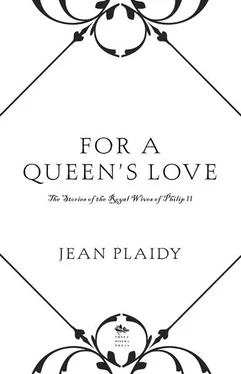Jean Plaidy - For a Queen's Love - The Stories of the Royal Wives of Philip II
Здесь есть возможность читать онлайн «Jean Plaidy - For a Queen's Love - The Stories of the Royal Wives of Philip II» весь текст электронной книги совершенно бесплатно (целиком полную версию без сокращений). В некоторых случаях можно слушать аудио, скачать через торрент в формате fb2 и присутствует краткое содержание. Жанр: Старинная литература, на русском языке. Описание произведения, (предисловие) а так же отзывы посетителей доступны на портале библиотеки ЛибКат.
- Название:For a Queen's Love: The Stories of the Royal Wives of Philip II
- Автор:
- Жанр:
- Год:неизвестен
- ISBN:нет данных
- Рейтинг книги:5 / 5. Голосов: 1
-
Избранное:Добавить в избранное
- Отзывы:
-
Ваша оценка:
- 100
- 1
- 2
- 3
- 4
- 5
For a Queen's Love: The Stories of the Royal Wives of Philip II: краткое содержание, описание и аннотация
Предлагаем к чтению аннотацию, описание, краткое содержание или предисловие (зависит от того, что написал сам автор книги «For a Queen's Love: The Stories of the Royal Wives of Philip II»). Если вы не нашли необходимую информацию о книге — напишите в комментариях, мы постараемся отыскать её.
For a Queen's Love: The Stories of the Royal Wives of Philip II — читать онлайн бесплатно полную книгу (весь текст) целиком
Ниже представлен текст книги, разбитый по страницам. Система сохранения места последней прочитанной страницы, позволяет с удобством читать онлайн бесплатно книгу «For a Queen's Love: The Stories of the Royal Wives of Philip II», без необходимости каждый раз заново искать на чём Вы остановились. Поставьте закладку, и сможете в любой момент перейти на страницу, на которой закончили чтение.
Интервал:
Закладка:
There was a knock on the door, and Mary cried: “Enter.”
The door was opened, and a herald announced: “The Princess Elizabeth.”
Philip had hastily hidden himself behind the curtains. His heart had begun to beat faster. He had heard so many tales of his young sister-in-law. Was it, he wondered, that nowadays every woman except his wife must excite him?
Mary was sitting in her state chair when Mistress Clarencius and Sir Henry Bedingfield brought in the Princess. Mary dismissed Mistress Clarencius and Bedingfeld as Elizabeth fell to her knees.
Through a small gap in the hangings, Philip watched the girl. He saw an elegant young woman with reddish hair and blue eyes; she was rather pale, no doubt because she had suffered many an illness in recent years, generally supposed to be due to her imprisonment and her perpetual fear of death. She lived midway between the executioner’s axe and the throne, and would never be sure which way her steps must take her.
He noticed how cleverly she had dressed herself to enhance what beauty she had; he saw the rings which glittered on her beautiful white hands, and he was aware of how she deliberately displayed them even at a time such as this.
She said: “Your Majesty sent for me?”
“How else could you be here?” asked Mary coldly.
The long, sandy lashes were immediately lowered over the blue eyes. Philip sensed how vital she was. She looked demure, but she did not deceive him for a moment. She was all fire; within her ambition mingled with her womanliness. She might wish, as he had heard, to be a much-desired woman; but her burning desire was to be a Queen.
He must watch her very carefully. She must indeed be made to marry his cousin of Savoy and banished from her country, for one thing was certain: where she was, there trouble would be also.
Elizabeth kissed the Queen’s hand, but Mary withdrew it immediately.
Elizabeth cried with passion: “Your Majesty must believe in my loyalty. Much slander has been spoken against me.”
“Why is it that you always attract such slander?”
“Because it is the desire of mean-spirited people to misrepresent me, to undermine your Majesty’s faith in me. I have never sought to rival your Majesty.”
“What of your relationship with Courtenay?”
Elizabeth fluttered her eyelashes and allowed herself to look even more demure. “That, your Majesty, was no fault of mine.”
She implied, as she said this, that she could not help it if men such as Courtenay found her so attractive that they risked their heads for her sake, even though she knew them to be acting foolishly and had no wish to accept what they offered her.
Elizabeth’s vanity always annoyed Mary; yet, knowing this, and being wise and quick-witted in all other matters, Elizabeth could not eschew it, such was the pleasure of flaunting herself as the irresistible woman.
“I think otherwise,” said the Queen. “I doubt your innocence. There are too many stories.”
“Your Majesty, it is true that men when racked have spoken against me, but can confession made under torture be relied upon?”
Mary said: “Do you swear that you have never been involved in any rebellion against me?”
“I swear it, your Majesty.”
“Would I could believe it!”
“Your Majesty must believe what is true.”
“If you would confess your offense, sister …”
“Your Majesty, gladly would I do so if I had aught to confess.”
“You stand stoutly in your truth, then?”
“I do, your Majesty.”
“I pray God that it will so fall out that you speak the truth, for if you do not and we discover it, then your punishment would be the greater for your deceit.”
“If your Majesty discovered aught against me to be true, then should I deserve all that befell me, and I should never sue your queenly mercy.”
“That we shall see,” said Mary. “Now I am tired. You may go back to your apartment. I have decided to forgive you this time, and unless I find aught against you, you may join our Christmas revels.”
The Princess took the Queen’s hand and insisted on kissing it. “Beloved sister,” she said, “never shall I forget your clemency.”
What was going on behind those blue eyes, Philip wondered. Was she already deciding what dresses, what jewels, she would wear to charm the courtiers? Was she praying that the child in Mary’s womb might sicken and die before it saw the light of day? Was she waiting for the moment when none stood between her and the crown? It might be any of these things; and Philip realized that it could be all of them.
When she had gone he stepped from behind the curtains.
“What did you think of my sister?” asked Mary.
“Comely enough. Shrewd too, I should say.”
Mary looked at him, noting the flush on his pale cheeks. Had he been slightly attracted by Elizabeth? Elizabeth herself so believed that every man must fall in love with her, that others found themselves believing it also. But Philip was no philanderer.
His next words disarmed her suspicions. “It would be well to marry her to Philibert. She is ripe for marriage.”
But on looking at him more closely, Mary began again to wonder.
That was a merry Christmas. What tournaments, what jousts there were, with all the nobility of Spain to tilt against the lords and dukes of England!
There were the usual rivalries; there was sly English laughter at Spanish dignity, Spanish disdain of English crudity.
Philip was happy thinking: Before the summer is here, I shall have left England. Once the child is born, I shall be away—and if he is healthy, my duty is done.
He was watching Magdalen Dacre, that strange girl who seemed remote yet conscious of the honor he conferred on her when he singled her out. It was not always true that English and Spaniards did not get on well together. There were the Count of Feria and Jane Dormer to prove that. Feria had told Philip that he had fallen in love with the English girl and wished to break off the engagement he had made with a Spanish lady of noble birth. What could Philip say to that but wish him luck? If Feria could satisfy the family of his first love, there was no reason why he should not marry Jane Dormer. What a useful spy that lady should make for Spain!
The red-headed Princess, who, delighted to be back at court, was throwing herself wholeheartedly into the revels, gave him cause for anxiety. He suspected her of … he knew not what. Every action which seemed so spontaneous could have its motive. Courtiers said: “How gay it seems now that Elizabeth is back at court!” and he knew they meant to convey: What gaiety there could be, what merrymaking, if she were Queen! That was what she intended; while she was demure she was bold; she seemed full of humility, but what arrogance shone from those blue eyes!
He could not forget her; she turned his thoughts from Magdalen Dacre. When they had met she had made a charming speech of welcome as his sister-in-l aw. Yet what had she really thought of him? He could not understand her; she was all that he was not, and he felt that that gave her an advantage; he could not look at her without being reminded of the immensity of her importance. He was determined to get her married to Emmanuel Philibert of Savoy.
Philibert sat beside him now. What more handsome man could she hope to marry? He was the hero of many a battle. Alas! he had little fortune to offer; but what had Elizabeth apart from her questionable birth and her high hopes?
He watched her in the dance, flushed, excited, lifting her eyes to her partners—flirtatious and yet so regal. He whispered to Mary: “I would speak with the Princess. Summon her here. Philibert must have his answer.”
Mary was nothing loth. She would like to see Elizabeth banished from the country, but there was one thing she would not do, even for Philip, and that was acknowledge her sister’s legitimacy. To do so would cast a slur on her own birth, for how could Elizabeth’s mother, Anne Boleyn, have been the true wife of Henry VIII, while he had another wife living, and that wife Mary’s own mother, Katharine of Aragon? No; at all costs she must stand out against Elizabeth’s legitimacy.
Читать дальшеИнтервал:
Закладка:
Похожие книги на «For a Queen's Love: The Stories of the Royal Wives of Philip II»
Представляем Вашему вниманию похожие книги на «For a Queen's Love: The Stories of the Royal Wives of Philip II» списком для выбора. Мы отобрали схожую по названию и смыслу литературу в надежде предоставить читателям больше вариантов отыскать новые, интересные, ещё непрочитанные произведения.
Обсуждение, отзывы о книге «For a Queen's Love: The Stories of the Royal Wives of Philip II» и просто собственные мнения читателей. Оставьте ваши комментарии, напишите, что Вы думаете о произведении, его смысле или главных героях. Укажите что конкретно понравилось, а что нет, и почему Вы так считаете.












